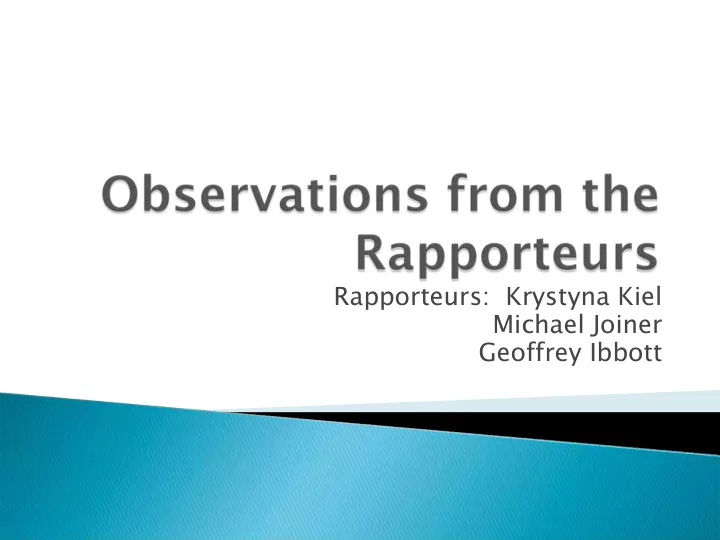

Rapporteurs: Krystyna Kiel Michael Joiner Geoffrey Ibbott
� Radiation Oncology � Radiation Biology � Radiation Physics
� Cancer incidence, stage and treatment varies with region, economic status Developing countries: ◦ � Cervix, Head & Neck, Lung, Breast � More often advanced stage � Treatment more often for palliation, although number of curative cases is increasing Developed countries: ◦ � Lung, Breast, Prostate � Early detection and awareness/prevention programs � Treatment more often for cure
� Barriers in Developing Countries Need for more RT facilities ◦ � Many countries have no RT facilities � Machines/population is very low Perception that radiation is only for palliation ◦ People with means go elsewhere for treatment ◦ � Economic drive to introduce advanced technologies Often a lack of multidisciplinary protocols and tumor ◦ boards, i.e., for pediatric tumors MONEY MONEY ◦
� Issues in Developing Countries Interest in introducing advanced technologies ◦ without sufficient resources or evidence Potential for adopting new technology (e.g., IMRT) ◦ without full appreciation of risks Lack of qualified personnel ◦ Lack of training for advanced technologies ◦
� Experience in 3D treatment planning is essential prior to initiating more-advanced technologies � Certain populations might benefit from adv. tech. � Technology separates physician from patient Too easy to depend on technology ◦ � Many advances in imaging are exciting May help better determine target ◦ � Reduction in field margins should be accompanied by image guidance, compensation for motion Requires studies to prove we can use this capability ◦
� Hyperfractionation and accelerated fractionation are not as promising as expected � Hypofractionation is useful as a resource- sparing approach to cancer treatment Evidence in lung, brain, prostate, breast cancer ◦
� Advanced technologies very demanding of resources � Technologies are under development, not all deficiencies are resolved � New techniques (e.g., IMRT) can produce poor results if QA not adequate � Overwhelming majority of participants recognize continuing role for Cobalt units. � Potential exists for advanced treatment methods with Cobalt
� IMRT: Inadequacy of some planning systems ◦ Studies show inability of planners to achieve goals ◦ Studies show planned distribution often not delivered ◦ Studies required to prove value before widespread use ◦ � Small radiation fields Appropriate calibration equipment often not available ◦ Equipment often can’t deliver reference field size ◦ � New technologies are advancing faster than appropriate QA programs can be developed
� Global shortage of skilled professionals � Will be a long-term demand for trainers and educators � Training must be adapted to working environment and available technology � Insufficient recognition of value of training � Programs should include broad education � Role for networking on national and regional level to support education � IAEA support for education and training was recognized and appreciated
The rapporteurs found the conference enlightening and enjoyable We are grateful for the support of the IAEA for our participation
Recommend
More recommend